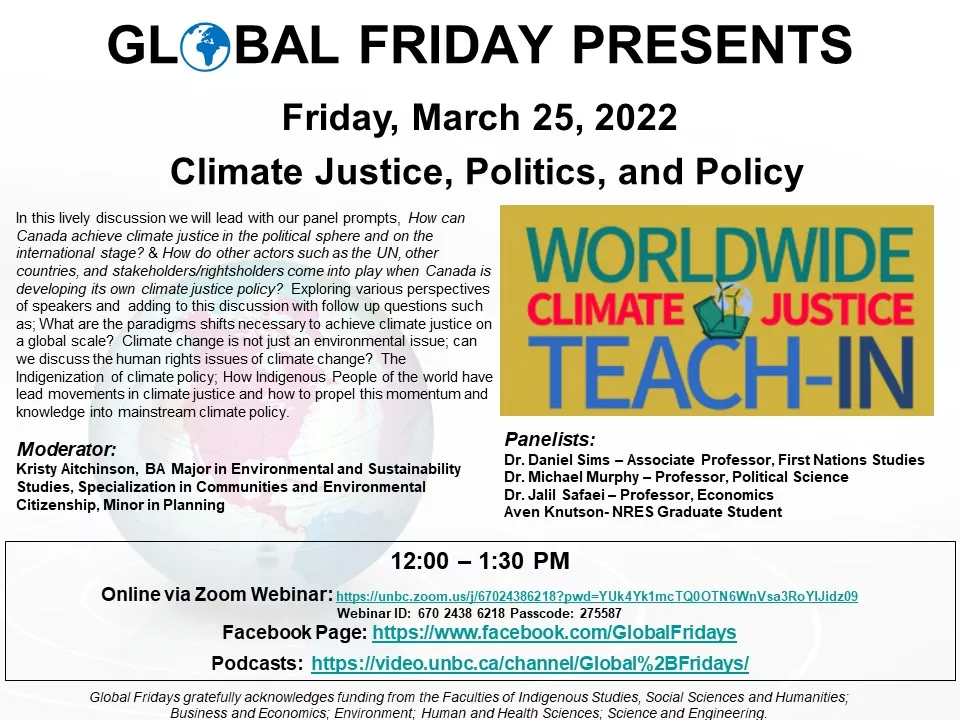Climate Justice, Politics, and Policy

As part of the Environmental Studies Senior Capstone course (ENVS480), we are organizing a three-day Climate and Justice Teach-In being hosted at UNBC, March 23-25, 2022. . This Global Friday's is in partnership with the three-day Climate and Justice Teach-In which is part of the Bard College Worldwide Initiative. In conjunction with Bard College, institutions around the world will be hosting teach-ins at the end of March with the aim of engaging their campuses and communities in critical dialogue on climate solutions and justice. As we are all part of “Canada’s Green University,” we feel that it is important that our whole campus participates in these discussions and bring forward the work that our faculty, staff, students, and community are doing around these issues.
In this lively discussion we will lead with our panel prompts, How can Canada achieve climate justice in the political sphere and on the international stage? & How do other actors such as the UN, other countries, and stakeholders/rightsholders come into play when Canada is developing its own climate justice policy? Exploring various perspectives of speakers and adding to this discussion with follow up questions such as; What are the paradigms shifts necessary to achieve climate justice on a global scale? Climate change is not just an environmental issue; can we discuss the human rights issues of climate change? The Indigenization of climate policy; How Indigenous People of the world have lead movements in climate justice and how to propel this momentum and knowledge into mainstream climate policy.
Panel Prompt:
How can Canada achieve climate justice in the political sphere and on the international stage? How do other actors such as the UN, other countries, and stakeholders/rightsholders come into play when Canada is developing its own climate justice policy?
Moderator: Kristy Aitchison, BA Major in Environmental and Sustainability Studies, Specialization in Communities and Environmental Citizenship, Minor in Planning.
Panelists:
Dr. Daniel Sims – Associate Professor, First Nations Studies
Born and raised in Prince George, Dr. Daniel Sims is a proud member of the Tsay Keh Dene First Nation. His research focuses on northern British Columbia and he has worked extensively with not only his own community, but also the related communities of Kwadacha and McLeod Lake.
He is currently working on two books on the impacts for the WAC Bennett Dam and Williston Lake Reservoir on surrounding communities. He is also working on a research project, titled "A Forgotten Land: Development in the Finlay-Parsnip Watershed of Northern British Columbia, 1860-1956," that examines numerous proposed developments in the Finlay-Parsnip watershed through the lens of concepts of wilderness, development, and colonialism.
Dr. Sims also works as a consultant and/or researcher for hire and has given numerous public talks and workshops on topics ranging from reconciliation, Indigenization, and the history of colonialism in British Columbia and Canada.
Research fields: First Nations, History
Expertise Indigenous Studies, History, Reconciliation, Indigenization
Dr. Michael Murphy – Professor, Political Science, NRES Graduate Program
Earning his PhD in Political Science from McGill University, with a specialization in political theory, Dr. Murphy pursued postdoctoral positions at the University of Auckland and Queen's University and then began teaching political studies at the University of Otago. In 2006, he joined the UNBC Department of Political Science. From 2006 to 2015 Dr. Murphy held the Canada Research Chair in Comparative Indigenous-State Relations, and in 2016 he was promoted to Full Professor.
Dr. Murphy’s research includes Indigenous rights and self-determination, multiculturalism, diversity and democracy, democracy and democratization, ethics and politics, and the philosophical and political linkages between freedom and well-being.
Dr. Jalil Safaei - Professor and Chair, MA INTS Co-Chair, Economics and International Studies Graduate Program
Dr. Safaei's main research is on social determinants of health, political economy of health and healthcare, social policy and welfare systems, health inequity, and human rights. His research interests spread to macroeconomics and the chronic issues of poverty and inequality.
Research and expertise include, Political Economy of Health and Healthcare, Health Inequities, Social Determinants of Health, Social Policy, Evaluation of Healthcare Policies, Public and Population Health
Aven Knutson – NRES Graduate Student
'Indigenous Self-determination in a Climate Planning Partnership'
Aven’s thesis aims to document the partnership approach to climate change planning undertaken by the Yukon Government and its Indigenous partners in the design of Our Clean Future. She aims to assess the suitability of this state-Indigenous collaborative climate planning process in representing community voices and agency in policy development and outcome, and to develop recommendations to guide future climate planning partnerships between governments and northern communities.
Online via Zoom Webinar: https://unbc.zoom.us/j/67024386218?pwd=YUk4Yk1mcTQ0OTN6WnVsa3RoYlJidz09
Webinar ID: 670 2438 6218 Passcode: 275587
Global Fridays gratefully acknowledges funding from the Faculties of Indigenous Studies, Social Sciences and Humanities; Business and Economics; Environment; Human and Health Sciences; Science and Engineering.